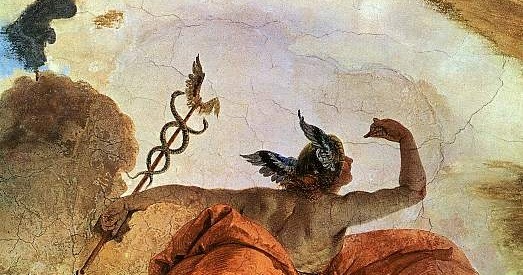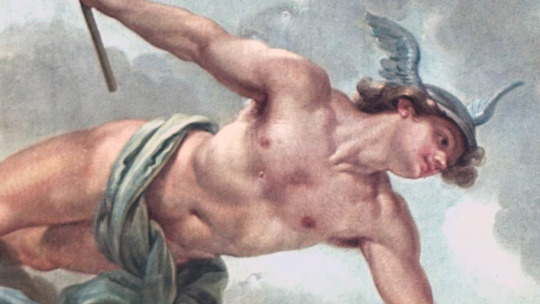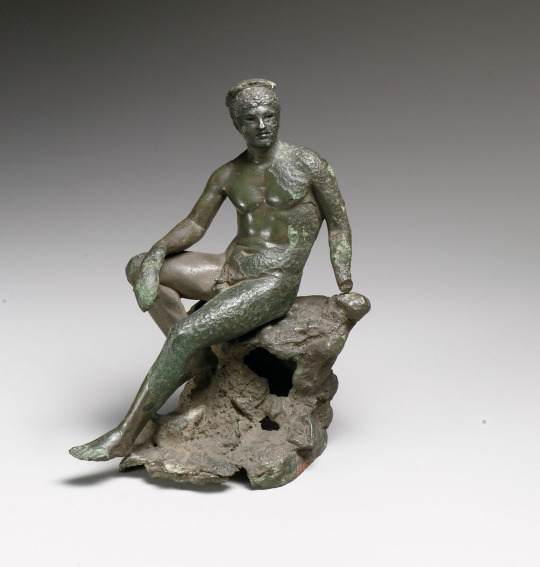#hermes chthonios
Explore tagged Tumblr posts
Text
[@crows-father]
Mike wasn’t usually one to handle looking after his and Pac’s - patients? Projects? What do you call the leg, not the person?
But then Phil came along, and Mike got to make a bird leg, with functioning talons and gripping features and wow.
“So, you will need to wear this sleeve over the stump - leg, whatever you prefer to call it. It helps to keep the prosthetic from rubbing across the skin and causing scraps or general soreness, then you’ll wear your prosthetic and… tada!” He held his hands out and wiggled his fingers for added affect, letting Pac offer Phil the silicone sleeve.
21 notes
·
View notes
Text
𝐀𝐧𝐭𝐡𝐞𝐬𝐭𝐞𝐫𝐢𝐚




⠂⠄⠄⠂⠁⠁⠂⠄⠄⠂⠁⠁⠂⠄⠄⠂⠄⠄⠂⠂⠄⠄⠂⠁⠁⠂⠄⠄⠂⠁⠁
What is Anthesteria?
Anthesteria, celebrated from the 11th to the 13th of Anthesterion (February–March), was one of the biggest festivals dedicated to Dionysus. Known as the Festival of Flowers, it marked the arrival of spring, the opening of the new wine casks, and the renewal of life. But it wasn’t just about feasting and drinking, it was also a time of purification, fertility, and remembrance, when the boundary between the living and the dead grew thin.
At the heart of the festival was the ritual opening of the wine casks that had been fermenting since the last harvest. This wasn’t just practical; it was symbolic. The wine had been maturing underground, just like Dionysus himself had once been carried in Zeus' thigh before being "born again." Bringing the wine to the surface was more than just a tradition,it was a reflection of Dionysus’ own myth.
But Anthesteria wasn’t all joy and celebration. It was believed that during these days, spirits wandered freely, so while people enjoyed the festivities, they also took precautions to protect themselves. The festival was a strange mix of life and death, revelry and ritual, perfectly embodying the nature of Dionysus, a God of both wild celebration and deep mystery. During Anthesteria, it was also said that the maenads celebrated privately in the mountains and forests. In some legends, Dionysus' marriage to Ariadne was held during Anthesteria.
⠂⠄⠄⠂⠁⠁⠂⠄⠄⠂⠁⠁⠂⠄⠄⠂⠄⠄⠂⠂⠄⠄⠂⠁⠁⠂⠄⠄⠂⠁⠁
Days of Anthesteria
Day 1: Pithoigia (Jar-Opening) 🌸
The first day of Anthesteria, Pithoigia, was centered around the ritual opening of the pithoi, large clay jars that contained the previous year’s wine. These casks had spent months underground, and now, they were unearthed and brought to the sanctuary of Dionysus. A portion of the wine was poured out as an offering, and the rest was shared by all members of the household.
The day was filled with flowers, marking the beginning of the season. Everyone over the age of three was invited to participate in the first taste of the new wine, and the mood was communal and joyous.
Day 2: Choës (Pitchers) 🏺
The second day of the festival, Choës, was a time of popular merrymaking, characterized by wine-drinking contests in which even slaves and children participated. People dressed in their finest clothes, with some even embodying figures from myth connected to Dionysus. There were visits to friends and drinking contests, where participants had to drink an entire chous (about 3 liters) in complete silence. This day was open to everyone, even slaves, highlighting how Dionysus transcended the boundaries of class and status.
For children, Choës marked a special rite of passage. Boys reaching their second year were crowned with flowers and given small drinking vessels, symbolizing their gradual initiation into the community. Meanwhile, the devoted followers of Dionysus, his maenads and priestesses, took part in private, sacred rituals that marked the spiritual union between them and the god.
Day 3: Chytroi (Pots) 💀
The final day, Chytroi, was dedicated to the spirits of the dead. Pots filled with a sacred mix of seeds and grains, called panspermia, were offered to Hermes Chthonios and the wandering souls of the deceased. During this time, it was believed that the spirits of the underworld walked among the living. To protect against any malevolent spirits, people chewed on hawthorn leaves and smeared their doorways with tar. The festival came to a close with the dismissal of the spirits: "Away with you, Keres, it is no longer Anthesteria!"
With these words, the spirits were sent back to the underworld, and life in Athens returned to normal, marking the end of the brief but intense period when the living and the dead had shared the same space.
⠂⠄⠄⠂⠁⠁⠂⠄⠄⠂⠁⠁⠂⠄⠄⠂⠄⠄⠂⠂⠄⠄⠂⠁⠁⠂⠄⠄⠂⠁⠁
Activities To Do:
🍷 Drink wine, or any liquid that you like.
🍷 Place flowers on your altar.
🍷 Honor God Dionysus.
🍷 Go to pottery.
🍷 Make a special mask for Lord Dionysus.
🍷 Do a libation in nature.
🍷 Go to the theater.
🍷 Collect flowers from nature.
🍷 Read and recite the hymns to Dionysus.
🍷 Honor both life and death.
🍷 Take a walk in nature and/or in the mountains.
🍷 Draw Dionysus's symbol or carve His name in stones or wood.
🍷 Make art for Dionysus.
🍷 Make a flower crown.
🍷 Honor your deceased loved ones.
🍷 Leave offerings for spirits.
🍷 Light candles.
🍷 Plant seeds in your garden.
🍷 Plan a feast and celebrate with your loved ones.
🍷 Sing and dance while listening to your favorite songs.
🍷 Do creative activities like art or poetry.
🍷 Go wild and celebrate it as you wish, Kala Anthesteria!
⠂⠄⠄⠂⠁⠁⠂⠄⠄⠂⠁⠁⠂⠄⠄⠂⠄⠄⠂⠂⠄⠄⠂⠁⠁⠂⠄⠄⠂⠁⠁
#dionysus#greek mythology#paganism#hellenic polytheism#deity work#hellenic pagan#deity worship#witch#witchblr#witchcraft#hellenic community#hellenism#hellenic#hellenistic#helpol#god dionysus#lord dionysus#dionysian#dionysus deity#dionysos#bacchus#anthesteria#greek myth#ancient greek#hellenic paganism#pagans#pagan#pagan witch#paganblr#greek tumblr
386 notes
·
View notes
Text
ANTHESTERIA STARTS TOMORROW (NEXT THREE DAYS), MY FAVORITE FESTIVAL!!!!
For those celebrating, I hope you have a wonderful time! For those who are unfamiliar with the festival, here are some informative posts and the like:
~ 🍇 ~
Information:
On Antheaterion - @kallisto-aglaia
Anthesteria - @thegodsaremyhome
Anthesteria - @dionysusmybeloved
Ancient Greece's Biggest Festival: The Anthesteria - @margaretkart
Anthesteria - The First Day, Pithoigia - @aceofcupsbiggestfan
Anthesteria - The Second Day, Kheos - @aceofcupsbiggestfan
Anthesteria - The Third Day, Khytrai - @aceofcupsbiggestfan
Rethinking The Anthesteria - @thegrapeandthefig
Celebrating Anthesteria Without Alcohol - @thegrapeandthefig
Anthesteria - Hellenion.org (I do not personally endorse Hellenion, based on things I've heard about them, but they can still be a helpful resource)
Anthesteria - Britannica.org
The Anthesteria - World History Encyclopedia.org
Devotion:
Anthesteria Dionysus Invocation - @beatingdrumspouringwine
Protrygaios Hymn/Poem - @beatingdrumspouringwine
Orphic Hymn 46 to Dionysus - @dionysusmybeloved
Hermes Chthonios Hymn/Poem - @sanguinebutch
Anthesteria, Khytrai Lyre Melody - @princesmeadow
Anthesteria - @nyxshadowhawk (found on @dionysia-ta-astika )
Personal Dionysian Ritual, First Day - @beatingdrumspouringwine
Flower Poem For Bacchus/Poema-florido Pra Baco - @piristephes
Anthesteria Playlist - @nyxshadowhawk
Orphic Hymn 30 to Dionysus - @kallisto-aglaia
Celebration Ideas For Anthesteria - @khaire-traveler (me)
~ 🍇 ~
Have a lovely Anthesteria, everyone, and remember to put up protections to prevent any wandering spirits from sticking around ~~~
Hail Dionysus!!! 💜💚
#helpol#hellenic polytheism#hellenic pagan#anthesteria#dionysus deity#hermes deity#hellenic festival
374 notes
·
View notes
Note
It would be funny you should let them truth me
Hello Mike tazercraft would you like us to gayza truth you. Are you volunteering 🎗
Maybe he needs a cough drop.
9 notes
·
View notes
Photo

The Anthesteria
The Anthesteria celebrated two seemingly disparate things: wine and the dead. Both Dionysos and Hermes Chthonios (Hermes of the Underworld) were celebrated as part of this festival. In many ways, the Anthesteria is similar to our modern Halloween.
The festival took part over three days, from the 11th-13th of the month of Anthesterion (late February to early March by our calendar), with each day being given a special name. Both 'Anthesteria' and 'Anthesterion' derive from the Greek word anthos (flower), relating to their springtime setting. It should be noted that women, children, and slaves participated in this festival, too.
11th Anthesterion: the Pithoigia
The name of this day relates to its events and literally means, 'the opening of the pithoi (storage jars)”. On this day people gathered at the Sanctuary of Dionysos in Limnais, but did not enter it, and opened the pithoi that contained the wine made from the last autumn's grapes. The wine was then drunk. The drinking of the new wine on this day was quite sociable and moderate compared to the drinking which occurred on the second day.
Continue reading...
125 notes
·
View notes
Text
I havent read TSATS but since the underworld drains Will due to not being around the sun then we should flip that with the Chthonic kids
Chthonic kids who are weakened by being in direct sunlight and feel powerful in the land of the dead or underground.
Chthonic kids whose godly parents are primarily Ouranic but have some ties to the underworld (eg. Hermes Chthonios, Demeter Chthonia) are a toss up between being fine in both the underworld and the living world or have constant chronic fatigue in both worlds — only feeling relief when they're dying because they're in the middle.
That is why the Hypnos kids are so sleepy, that is why Nico gets so drained from his powers. They are not meant for this world, their fathers' domains are where they are strong.
#pjo#percy jackson#percy jackson and the olympians#pjo headcanons#pjo headcanon#Nico di angelo#wolffox speaks
28 notes
·
View notes
Text
Lord Hermes Deep dive

Lord Hermes is amazing, he is the darling of the gods and of our hearts, he is strong in gymnastics and in spirit, he is the last thing we see, and the lord of our words, and as a worshiper and as a researcher I believe he is amazing and wonderful, I absolutely adore him, so I should probably stop writing, or it'll become a love letter, but I've worshiped this god for around 2 years, maybe more, but I know well he is amazing and deserves respect.
Herbs • Krokos (Crocus) koumara Tree, olives/olive oil, hydrangea, chrysanthemum, Palm tree, Almond tree, The Silver Birch tree, Crocuses, Saffron, Wheat, Rosemary, Pine Tree, Mint, Cinnamon, Cassia, Golden Benzoin, moly, Strawberry Trees (Arbutus unedo).
Animals• sheep, dogs, boars, lions, Tortoise, Ram, The dove killing species of Hawk, Hares, constellation Lepus, pig, beef, mutton, pork, Cattle/oxen, roster, birds of omen, snakes, and guard dogs, fish, horses
Colors• Red, purple, silver, gold, copper, and black, Orange, Grey, Green, Red, white and brown (associated with traveling)
Crystal• Amethyst, Quartz, Orange topaz, Agate, Marble, smoky quartz, copper, silver, and gold, Eisenkiesel Quartz, Silver, Yellow Topaz, Amber, Citrine, Emerald, and Peridot, red marble, Hematite, jade, malachite, fluorite, pyrite, lapis lazuli, alexandrite
Symbol• Caduceus, Kerykeion (Herald’s staff and magic wand, lulls mortals to sleep and can wake mortals at will), Winged Cap (also called petasos, and a brimmed cap, this cap was called “Cap of Aidoneus, the unseen” because it rendered its wearer invisible), Golden Sickle, Winged Boots- called “pteroeis pedila”, A Sack (the kibisis) Talaria (winged sandals), and Petasos (winged helmet), golden or adamantine blade, shepherd pipes, Purse, Pouch, Hermai, koumara Tree
Mortal or immortal • immortal
Zodiac• Gemini and Virgo, and cancer
Equivalent (this means alike, not the same) - Mercury (Roman), Hyperion (Greek), , Horus (Egyptian), Ra (Egyptian), Amun (Egyptian), Freyr (Norse), Bragi (Norse), Odin (Norse), Baldr (Norse), Heimdallr (Norse), Lugh (Celtic), Áine (Celtic), Mercurius (Roman god), Thoth (Egyptian god), Anubis (Egyptian god), Woden-Odin (Germanic god)
Attendees • Oreiades (oreads), Pan & the panes, Satyroi, oneiroi, he is often seen with Hestia.
Ephiphets• Agetor -Guide of Souls, Agonius or Enagonius -pertaining (Hermes’ role as presider over solemn festivals such as Agonius) Agoraea and Agoraeus- to Gods who were considered being the protectors of the assemblies of the people in the agora (also has a reference to the agora as the marketplace), Argeiphontes- “radiant one’, Euskopos Argeiphontes, literally “the sharp-eyed Slayer of Argos”, Chthonius or Chthonios, “of the earth or underworld, Hermes Trismegistus- “Thrice Great Hermes”, Kriophoros- the “ram-bearer” is a figure that commemorates the solemn sacrifice of a ram, Leucus- “white”- an epithet of Hermes in Boetia, a Greek city containing Thebes, “Of the Golden Blade”- he carried a sickle made of adamant, Cyllenius, or Kullhnios- from His birth or temple site on mount Cyllene in Arcadia, Diaktoros Argeiphontes – “the courier” Argeiphontes, Kratus Argeiphontes- “strong” Argeiphontes, Hermes Promakhos- “the Champion” Logios- writer, knower of intelligent design, Tetragonos- four square, Aglaos -Splendid, Agoraios - Of the Market Place, Aipytos -Of Aipytos, Akakesios -Of Akakesion, Angelos -Messenger, Agreiphontes -Argus-Slaying, Bouphonos -Slayer of Oxen, Dioktoros -Messenger, Dolios -Crafty One, Enagonios- Of the Games, Enodios - of the Road, Epimelios - Keeper of the flocks, Eriounios - Luck-Bringer, Euangelos - Bringer of Glad Tidings, Euskopos - Watchful, Gumnasiarkhos - Leader of the Gymnasium, Hermeneutes - Interpreter, Kerdoos - the Gainful, Kerukes -Herald, Kharmophron—Heart-Delighting, Khthonios - of the Earth, Khrysorrhapis -Of the Golden Wand, Klepsiphron - Deceiver, Kourotrophos - Protector of Youth, Kranaios- unknown, Krateros - Mighty, Kriophoros - Ram-Bearer, Kullenios - Of Mount Kyllene, Logios -of Speech, Maiados Huios - Son of Maia, Mekhaniotes - Trickster, Nomios - Protector of Flocks, Oiopolos - Shepherd, Pantokrator- Ruler of the World, Pheletes -Thief, Poikilometes - Full of Various Wiles, Poneomenos - Busy One, Promakhos- Champion, Propulaios - Before the Gates, Psukhopompos - Conveyer of Souls, Takhus - Swift, Tetragonos - Square, Trikephalos - Of the Three Ways/Heads, Trismegestos - Thrice-Greatest, Tukhon- Bringer of Luck, Aglaos- Radiant, Bright, Beautiful, Pleasin, enevolent. Angelos Athanatôn - messenger of the gods, Angelos Makarôn- messenger of the Blessed, Akhos Phêlêteôn- leader of robbers and thieves, Chrysorrhapis- of the Golden wand, Dais herairos - comrade of the forest, Diaktoros- guide & messenger, Dolios- Craft of Wiles, Dôtor Eaôn - giver of good things, Dôtor eaôn- Giver of good things, Enagônions- giver of good things, Enagônios-of the game, Epimêlios-Keeper of the flocks, Erikydês- famous, glorious & splendid, Eriounês - Luck bringing & ready helper, Euskopos-Keen-sighted, Hermêneutês- interpreter/translator, Kharidôtês- giver of joy/graces, Kharmonphrôn- Glad-Hearted, Krateros- Strong & mighty, Kriophoros- ram bearer, Kydimos-glorious, mastêrios- of searchers, mêkhaniôtês-trickster, Oiopolos- sheep tending& shepherd, Phêlêtês- their, robber, rustler, poikilomêtês- full of various wiles, Polytropos - Much traveled& much wandering, pompaios- the guide (he’s a psychopomp)
Element • air
Number��Four, eight, Squares
Past courtships• Merope, Aphrodite, Dryope, Peitho, and Hecate,
Personality• People say he is chaotic, some say he’s wise and can be calm, he does give serious advice and is a serious guy, but he also has a sense of humor and won’t always steal from you. (he won’t if you ask him not to..I think.) He is also sassy and side eyes (from other people) I find him difficult to track down, He's very kind and upbeat sometimes, depends on how u contact him and what mood he's in, he gives great advice and someone good to depend on.
Patron of• of cunning thieves and liars, Patron of herdsmen, Patron of orators, Patron of inventors, Cattle-herders, Shepherds, Goatherds, Horse & mule breeders, Grazing pastures, Cave shelters, Guard-dogs, Animal predators, Bucolic poetry, music, Animal fables (ex- the tales of Aesop), Laws of hospitality, he is the Protector of guests, Cattle-rustlers, Bandits, Crafty thoughts, Mail carriers and sorters, Retail workers, Canvassers , Editors, journalists, and writers, Newspaper routes, Bank tellers, Carnies , Casino workers, Gas station attendants, Mechanics, presentations, public speaking, playlists (I've heard this years ago)
Diety of• Divine Trickster, boundaries and thresholds, Creator of civilization as Trickster (Merchants and as a main Theoi, he helped build civilization), Messenger of the Gods (he brings messages to the gods and for mortals), transgressor of boundaries and taboos (setting boundaries, road boundaries, door boundaries, etc.), Inventor of fire (said to invent fire due to cooking the cows in his first myth), Inventor of sacrifice (ex- his first myth, sacrificing cows to the gods), of mysteries (came from a poetic myth from a famous ancient Greece poet), Bringer of sleep (He brought Argos ((the giant with many eyes)) to sleep, to kill him), dreams (prophetic, said to come to mortals in dreams to deliver messages and in general), and visions (gave visions for messages and just because), free will (Personal diagnosis, but seen to be quoted as that throughout history.), Psychopompos or Guide of the Dead, Escort of the Gods (walking people, being a tour guide), thieves, graves (helping the souls move on), and heralds, Luck, Unexpected Fortune (Hes correlated with money as a ‘worker’ under Hades and in general), Giver of Good, of sacrificial priests (ex- his first myth, and he's associated with animals, like sheep and cows), successful communication with enemies (ex- radio, morse code, communicating/words), translation and language, gymnasia and athletic youth, world order (seen through festivals and as a god in general.), trade and commodities, astronomy (he's seen in general with Astronomy but sailors used to use stars to guide themself home.), knowledge, speech, Inventor of boxing (he invited boxing in a myth), running and foot races, god of exchange (trading/merchants), alchemy, science (seen to be associated with knowledge and science in myths and poetry), internet (communication, ‘prophecy” and fertility, etc.), Magic (he's seen as a magic god in general and also in magic tricks), Presider at solemn sacrifices, Divine Movement, Ruler of the Orphic House of Cancer (he's associated with the zodiac through myths and the animal), Ruler of the Planet Mercury (ex-Mercury is his name.), Western astrological signs of Gemini and Virgo, Scribe of the Gods (said to write down some myths and to deliver messages), Protector of all messengers especially in war (those who needed to deliver messages would pray to the god hermes and wear garments associated to him, it would be seen as taboo to kill/harm them, it was said he helped the mother/father of Hector to ask Achilles for his body.), Protector of wise women and elderly women, Fertility and Procreation (associated with sex, breeding of animals), God of Masturbation (Associated with sex and breeding of animals), Soul Transformation and Guide through Consciousness changes, Heraldry and animal husbandry, speed, Codes, and Secrets (communication), Caretaker of graves, Protector of travelers, Mechanics, Wine-pourer of the Gods (only said alike that in some poetry), Inventor of weights and balances (he's associated with working out and the gymnasium/gymnastics and the Olympics), Controller of Birds of Omen, hospitality, diplomacy, physical and moral boundaries, Orators, presentation, public speaking
Home• Mount Olympus
Fact• He invented the alphabet and dice and the lyre, he also has a stone called the “hermai” on the side of the road or a stone with a penis (he was a fertility god) to show a border or a crossing, sometimes to explain direction and distance, or in important landmarks is up ahead, the herms were worshiped, with offerings and anointed with olive oil and adorned with flowers and wreaths, telling us about the sacredness and importance of the hermai. (The ones near tombs are also connected to funeral rites). Some say he created fire, because in his myth of his birth he started a fire to sacrifice cows to the gods.
Roots• Greek mythology, Mount Cyllene
Blessings • protection on the road, money randomly found, easy speaking, good parking, and less traffic. Herds multiply (fertility); Herds protected (from predators), Success in trade, Goods protected from thieves, having Persuasive speech, Poetic inspiration, Safe traveling, Protection of guests, Homes protected from thieves & criminals, having Wiliness and stealth,
Curses: Herds die off by disease and infertility, Herds lost to predators, Unsuccessful trade, loss in money, loss in memory, loss In conversation, unwelcome ghosts in the house.
Food recipe • Panspermia, a mixture of beans, peas, seeds, olive oil, milk, and honey, should only be offered to Hermes in his Underworld aspect. This offering is considered food for the dead and should not be tasted by the living (considered bad luck if Aten by living)
Offerings • Keys, Dice, Playing cards, Coins, Rocks/pebbles, Lucky charms (Cereal), Rabbit's foot, Horseshoe, Magic 8 ball,, Coffee, Energy drinks, Herms, Road trip snacks (perhaps Hostess donuts), Airplanes/trains/cars imagery, Foreign/new foods, Trail mix, Peanut m&ms, rumane the marble popping soda drink, Turtles, Lyres/string instruments, Sandals/shoes/running shoes, Journals, Camping gear, Survival gear, like multitools, fire starters, first aid kits etc, Pens/pencils, Small (stolen) trinkets, Language dictionaries, Work out gear, Panpipes, Postcards, Letters, Mail, Stamps, Envelopes, Zodiac signs, Sheep/goats, Car parts, Backpacks/drawstring bags/bags, Crocos, Sticks, Saffron, Sticks, Books, Cups, Scales, Dream journals, Graveyard dirt, Cookie fortunes, Bikes/skateboards/skate, Old licenses/IDs, Sport trophies/jerseys/jackets/gear, Wings, Letters/numbers, Video games, Magic kits, Oranges/Lemons, Beer, White wine, Red wine for (His chthonic aspect), Milk, Mutton, Pork, Beef, Chamomile tea, Honey, Olive oil, Strawberries, Foreign foods, Eggs, Virgo or Gemini moon water,Golden objects, Silver objects, Musical instruments, Wands, Money/coins, Foreign money/coins, Dice, Pebbles, Feathers, Turtle shaped objects or art, Strawberry art or toys, Crocus flowers, Written stories or letters, Travel food, Souvenirs from your trips wheat, honey, twigs of olive, honey-comb and honey from local bees, cassia, cinnamon, saffron, include eggs, onions, garlic, pomegranate seeds, and fish or pork, barley grains, mead, beer (Especially German), lead, papyrus, pebbles, herms (or boundary stones), chocolate, whipped cream, coffee drinks, brightly-colored easter eggs, blueberries, granola, almonds, walnuts, pecans, Absinthe, beer, gin, vodka, red-bull, dry white wine, blessed moon water (especially in Virgo, Cancer, or Gemini), metal, jars, gin, pomegranates, onions, fish, garlic, Statues, Turtle Imagery, Hawk Imagery, Ram Imagery, Rooster Imagery, Marbles, Postcards, Chocolate, Lemons, Almonds, Mutton, Foreign Food, Brightly Colored Eggs, Onions, Sunflower Seeds, Fig Newton Cookies, Granola, Candies, Strawberry Milk, spring water, cookies or cakes, Wine, Golden cakes, Golden raisins, Apples, Music or poetry, Dancing, Drawings, pineapple, anything with computers, (especially boxing games, online games, and hackers), orange peels, gas station coffee, apples, bananas, grapes, Anything containing mercury, Crocuses, Panpipes, Saffron, Strawberries, Chocolate, Wheat, Honey, Lemons, Almonds, Cassia, Cinnamon, Pork or mutton, Spring water, Comforting a dying loved one
Devotional• Board games, Dominos, pick up sticks, playing jacks, bouncy balls, peanut m&ms, write letters, go on walks, go run, do marathons in his honor, road trips, learn about alchemy, astrology, astral travel, prophet dreams, anything astrology related, learn basic car mechanics, give whatever to panhandlers, go talk to panhandlers (keep them company) , pranks, public speaking, tip well, stargazing, geocaching, learn a new language, Learn ASL, work out, Deive safely and predictably, use your blinkers fucking properly , bike/skate, clean your car, make a travel alter (for Hermes), get a passport, Travel , practice keyboarding, have a penpal, Train your voice, magic tricks, check your mail/email , low risk gambling (ex• lotto tickets) , make sigils, race, Play tag, be nice to wait staff, play sports, make maps of trails near you, make maps in general, play string instruments , Make herms, Carpool, Uphold confidentiality, Coin tricks, Be a reliable worker, Thrifting/yard saying, Dumpster diving, Making trades and barter, Help look for missing people/pets, Travel to new places, Learn a new sport, Practice speaking in public or online, Practice writing, Learn astrology, Learn astronomy, Learn about agriculture and animal husbandry, Learn magic tricks, Collect coins, Have a feast in His name, Dice games (ex- DnD), Card games, Donate to homeless shelters in His name, Give money to the hhomeless, Keep a dream journal, Write Him stories and poems or jokes, Honor the dead, Invoke Him on your travels or when looking for a job, always thank Him when you arrive safely or have some luck in your life, studying, learning, playing harmless pranks, attending magic shows, going on adventures, trying out new things, donating to fundraisers, working out, Taking a scenic route on your way home,Picking up loose change, Going to thrift stores, Being patient with delivery drivers, Going for walks, Making a mood board, Making a playlist, Making a dedicated journal, Giving to those in need, Going to/Watching sporting events, Practicing safe driving, Donations to hospitals and health institutions Donations to local artists, learn on how to save on gas, learn how to surf, draw sigils on shoes, leave coins when you leave places (extra points for pennys), give people in need a bus fare, clean off snow on other peoples car, clean your car, stopping for others (nicely, don’t run them over!), let him pick music, get a passport in his honor, decorate your passport, learn how animals communicate, call a love one, establish and force, dedicate a electronic to him, collect stamps and post cards, keep ur secrets, communicate with people when your upset,Keep a journal, Learn a new language/Revisit, Learn ASL, Learn about the evolution of language and how it is always changing, Be mindful of the language you use in daily life, Change your self-talk to positive, Voice training (Particularly for trans worshippers), Thinking before you speak, Learn about older forms of communication (ex- Morse Code), Learn braille,Go to the library and practice reading books in a foreign language ,Practice writing (great to do, Learn about the elements of writing, like allegory and metaphors, Play pranks (remember that good pranks cause confusion, not harm), Buy scratch offs/play the lottery, Understand how gambling addictions affect people, Dice and card games, Learn about good luck charms/Make your own, Learn about superstitions, Games like billiards or darts, Arcade/video games/carnival games, Make small/friendly bets, Poker nights in his honor, Do aGame of horseshoe, Learn parlor games, Smoke a bowl with Him, Learn a good joke, Write/perform stand up comedy, Checking your mail, Checking email/voicemail, Buying stamps, Flipping a coin, Dice divination, Charm casting, present a presentation in his honor, public speaking in his honor
Siblings• Aeacus, Angelos, Aphrodite, Apollo, Ares, Artemis, Athena, Dionysus, Eileithyia, Enyo, Eris, Ersa, Hebe, Helen of Troy, Hephaestus, Heracles, Minos, Pandia, Persephone, Perseus, Rhadamanthus, the Graces, the Horae, the Litae, the Muses, and the Moirai.
Appearance in astral or gen• Winged cap and boots, Traveller’s cloak, Youthful usually beardless figure or with a beard, with a Caduceus, sometimes seen with a mustache
Parentage• Zeus and the nymph Maia or Uranus and Hemera
Sacred days, festivals- Wednesday, the 4th day of the month, Hermaea, Agonius, in Cydonia social order was inverted for the festival and masters waited on their slaves, and slaves got to taste freedom.
Season• March, April, May, June (based on zodiacs)
Status• Messenger of the gods, and an underworld worker, he is called the darling of the gods
Music • anything from flutes or the lyre.
Sacred places• Mt Kyllene in Arkadia (his birthplace), Arcadia, mount Cyllene, Tricrena mountains, his Temples, his Cavern-shrines, Altars in market-places, gymnasiums, athletic arenas, house entrances.
Planet• mercury
Tarot• eight wands, magician, judgment, and maybe seven swords
Scents/Inscene • Frankensince, Myrrh incense, Lavender incense, strawberry, camphor, and malabathrumcock, storax, mastic, mace, moly, nettles, asafoetida, ginger, and marjolane, dragon’s blood incense, list cloves, tobacco, nag champa, poppy, and vanilla, ink on parchment, Musk, White Sandalwood, Nettles
His kids -Hermaphroditus, Tyche, Abderus, Autolycus, Eudorus, Angelia, and Myrtilus, Arabos, Abderos, Aithalides, Bounos, Daphinis, Ekhion, Eleusis (according to others, she was a minor goddess of Eleusinian Mysteries), Euandros, Kaikos, kephalos, keryx, kydon, libys, Mytilos, Norax, Orion, Paris, Paris, phaunos, polybos,saon
What I associate with him• rock music, bricks, dinosaurs, and wine (I promised to share my first cup of wine with him once I turn 21)
Some summarized myths •
Birth- Hermes was born from his mother Maia, the goddess of the fields, and his Father Zeus, he hid in a cave with his mother in Mt. Cyllene in Arcadia, the same day he was born (or when he was a toddler), he ran away while his mother was out, he stole cattle and turned their feet backwards, to 'trick' Apollo, he went back to the cave and made a fire and sacrificed 2 cows to catch the gods attention and ate 1 and hid the rest, outside after he ate he saw a tortoise feeding and cleaned it out and made strings together from a cow he ate, and made a lyre and a plectrum, and Apollo found him, furious he took him to his father and he denied everything and zeus found it hilarious, and he had to head back to the place where he hid the cattle, on the way he played the lyre, Apollo was enamored by it and asked for it and in return he would be his best friend and forgive him, and while helping Apollo tend to the cattle he made pan pipes, which Apollo made him a deal for his iconic golden snake staff and the skill of phropecy by using pebbles.
Killing Argos- Zeus had a lover Io, Who he was laying with in a field, Hera saw and strolled over, he struck in panic turned her into a cow, and Hera came over and demanded it as a gift, and zeus obliged, zeus in a panic asked Hermes to slay it, Hermes went to the cave where the all-seeing giant was, he lured him to sleep with a song, and when he was asleep, he slashed all his eyes and killed him, and took the cow and delivered it to Zeus, and in grief Hera turned the giant into a peacock to save the memory and to honor the giant. that's the myth where he gained the title 'Argos slayer'
Prayers•
Safe travels
Swift-footed Hermes, friend of the traveler, friend of those who find themselves far from their homes, by will or by chance, I pray to you. Hermes, who moves between the realms with authority and ease, who leads men and women on their last, longest journey, who stands at the crossroad, who watches the byways, in you I place my trust, for by your might I know that when I stumble I will rise again, that when I choose my way I will choose aright. Hermes, as I make my way through the world, whether I wander or whether I walk my path with care, be with me.
In general
Hermes of the ready wit and the lightning smile, wing-footed one who carries the words of the gods, compassionate one who guides the newly-dead to the hall of Hades and fair Persephone, quick-thinking one who takes interest in the world and works of mankind, whose hand we see in a run of luck and a clever scheme, I call to you. Hermes, bearer of the herald’s staff, your gifts are great. You guard our homes with constancy and care, you grant to us a portion of your own craft and wile, you join with us when we revel and are merry, you stand with us when we are far from home, alone. You are ever with us, O Hermes; O god who holds in hand the good of men, I honor you.
hestia & hermes for good money
I call to Hermes, god of the marketplace, god of the the deal, from whose hands fall shining coins. I call to Hestia, goddess of the home, goddess of good management, who knows the ways of thrift. Grant me a keen eye to spot a bargain, I pray; grant that I know false economy from true. Grant me the craft to repair what is broken, grant me the sufficiency to save for what may come. Grant me the wisdom to live with care, O gods, the discipline and skill to live within my means; grant me the wit to know my needs and my desires, grant me the judgment to know the difference.
This info is some UPG and some traditional, I do not find UPG disrespectful at all and some of it is my own experience, and I am not debating about it. My info is still valid, and I'm sure my sources is, just wanted to clarify this! Much love! I did get some info from other Tumblr users, I made this way back, I still update it, I dont own any of this information.
sources - https://twelfthremedy.tumblr.com/post/621849449656942592/hermes-offerings/amp
Wikipedia. “Agetor.” Wikipedia, the Free Encyclopedia. Wikipedia, 10 Nov. 2010. Web. 12 May 2011. http://en.wikipedia.org/wiki/Agetor.
Burkert, Walter. “The Gods.” Greek Religion. Basil Blackwell and Harvard UP, 1985. 156-59. Print.
The original book was published in Germany as Griechische Religion der archaischen und klassischen Epoche. by Verlag W. Kohlhammer, Stuttgart, copyright year 1977
1b) Atsma, Aaron J. “ESTATE, ATTRIBUTES & ATTENDANTS OF HERMES : Greek Mythology.” THEOI GREEK MYTHOLOGY, Exploring Mythology & the Greek Gods in Classical Literature & Art. 2000. Web. 13 Apr. 2011. http://www.theoi.com/Olympios/HermesTreasures.html, Wikipedia. “Agonius.” Wikipedia, the Free Encyclopedia. Wikipedia, 10 Nov. 2010. Web. 12 May 2011. http://en.wikipedia.org/wiki/Agonius, Wikipedia. “Agoraea.” Wikipedia, the Free Encyclopedia. Wikipedia, 26 June 2010. Web. 12 May 2011. http://en.wikipedia.org/wiki/Agoraeus, Wikipedia. “Chthonius.” Wikipedia, the Free Encyclopedia. Wikipedia, the Free Encyclopedia, 20 June 2011. Web. 26 June 2011. http://en.wikipedia.org/wiki/Chthonius,Wikipedia. “Hermes Trismegistus.” Wikipedia, the Free Encyclopedia. Wikipedia, the Free Encyclopedia, 9 June 2011. Web. 26 June 2011. http://en.wikipedia.org/wiki/Hermes_Trismegistus., “Kriophoros.” Wikipedia, the Free Encyclopedia. Wikipedia, the Free Encyclopedia, 11 June 2011. Web. 26 June 2011. http://en.wikipedia.org/wiki/Kriophoros, Wikipedia. “Leucus.” Wikipedia, the Free Encyclopedia. Wikipedia, the Free Encyclopedia, 13 Feb. 2011. Web. 26 June 2011. http://en.wikipedia.org/wiki/Leucus, Atsma, Aaron J. “ESTATE, ATTRIBUTES & ATTENDANTS OF HERMES : Greek Mythology.” THEOI GREEK MYTHOLOGY, Exploring Mythology & the Greek Gods in Classical Literature & Art. 2000. Web. 13 Apr. 2011. http://www.theoi.com/Olympios/HermesTreasures.html, “CYLLENIUS, Greek Mythology Index.” MYTH INDEX, Greek Mythology. Myth Index, 2007. Web. 13 Apr. 2011. http://www.mythindex.com/greek-mythology/C/Cyllenius.html, Sannion. “Wildivine.org – Offeringsto Hermes.” Wildivine.org – Dionysos, Hermes, Nymphs and Pacific Northwest Polytheism. Wildvine.org. Web. 26 June 2011. http://www.wildivine.org/hermes_offerings.htm.1, Sannion. “Wildivine.org – Offerings to Hermes.” Wildivine.org – Dionysos, Hermes, Nymphs and Pacific Northwest Polytheism. Wildvine.org. Web. 12 May, http://www.wildivine.org/hermes_offerings.htm, Sannion. “Wildivine.org – Hermes’epithets.” Wildivine.org – Dionysos, Hermes, Nymphs and Pacific Northwest Polytheism. Wildvine.org. Web. 12 May 2011. http://www.wildivine.org/hermes_epithets.htm.
https://greekpagan.com/category/prayers-2/hermes/
https://journal.uny.ac.id/index.php/diksi/article/download/49223/18693#:~:text=The%20red%20or%20green%20color,one%20of%20the%20Olympic%20gods.
travelingthief.tumblr.comhttps://www.tumblr.com/themodernwitchsguide

I use resources, I do not own the info, and most deep dives have UPG (that I use in my work.) And I only take some information from sources. I am 14, this is my hobby, I am learning but I spent many hours and days on this, and I am always open to criticism. I have been doing worship for 6 years. Please know you can use the info, I do not sue, but I will take action if this work is used without permission and not put as a resource if used in any work. without permisson and not put as a resource if used in any work, for the public. There will be repeated words because this was done BY HAND, not ai or anything
#the gods#hellenic devotion#hellenic polytheism#doing the research for you#hellenic worship#greek gods#greek mythology#hermes#greek tumblr#greek posts#ancient greek#/hermes#deity work#polytheist#deity worship#paganism#paganblr#hellenic pagan#hellenic paganism#hellenic polythiest#hermes deity
235 notes
·
View notes
Text





Halloween in February!
In the Byzantine Pagan tradition today is what I like to refer to as ‘Halloween in February’ — the ninth and last day of the Parentalia, known as the Feralia, and the third and last day of the Anthesteria, known as Khýtroi; the main reason, in fact, that the Classical Church celebrates the Anthesteria later than other Hellenist groups is so that these two festivals fall on the same day. In ancient Rome the Feralia was a holiday dedicated to propitiating the Manes, the shades of the dead who have passed on to the afterlife, in hopes of warding off their displeasure. Ovid tells us that the Romans once forgot to commemorate the Feralia during a time of war and the spirits responded by rising from their graves and rampaging through the streets of the city. From then on the people were fastidious in their observance of the holiday.
In ancient Greece Khýtroi was also considered a festival of the dead: offerings were made to Lord Hermes Chthonios and to the spirits of the deceased, who were beseeched to depart from the land of the living. Like the Feralia it was a day where sacrifices to the ouranic Gods were forbidden and little to no public business was attended to.
So let’s celebrate! Today is a day set aside for the remembrance of the dead and warding off evil spirits, after all, and I don’t know about you but that puts me in a Halloween state of mind — to commemorate the occasion I’ll be listening to my Halloween playlist all day (a rare treat so far from October) in addition to watching appropriately-themed media and thinking about those departed. I hope you all can get in on the spirit as well!
#paganism#polytheism#devotional polytheism#pagan#hellenic polytheism#deity worship#paganblr#hellenic pagan#hellenism#religio romana#roman polytheism#roman pagan#roman paganism#polytheist
25 notes
·
View notes
Text
Zeus Epoptes
~ 25 Metageitnion ~
While this festival surrounded an offering to Zeus Epoptes, many also focused on Hermes Chthonios. As this epithet of Hermes guides the dead many believed that he and Zeus Epoptes, as the overseer, guided the dead on this day.

Traditional Offerings:
Libations to Zeus
Libations to Hermes
Meat, bread and rain water
Incense of Frankincense
Traditional Acts:
Offerings to Zeus
Offerings to Hermes
Celebrating both Gods as well as the dead
Khaire Zeus! Khaire Hermes! 🌧️🪦🎇
#hellenic polytheism#hellenic witch#hellenic deities#hellenism#hellenic worship#hellenic polytheistic#hellenistic#theoi#helpol#zeus epoptes#hermes chthontic#hermes worship#lord hermes#lord zeus
13 notes
·
View notes
Text
Expulsion of the Dead in Ancient Greece
“The Athenians believed that at the festival of the Anthesteria the souls of the dead came back from the nether world and went about the city. Accordingly ropes were fastened round the temples to keep out the wandering ghosts; and with a like intention the people chewed buckthorn [1] in the morning and smeared the doors of their houses with pitch, [2] apparently thinking that any rash spirits who might attempt to enter would stick fast in the pitch and be glued, like so many flies, to the door. But at the end of the festival the souls were bidden to depart in these words: ‘Out of the door with you, souls. The Anthesteria is over.’ Yet for the entertainment of the unseen guests during their short stay earthenware pots full of boiled food appear to have been everywhere prepared throughout the city; but probably these were placed in the street outside the houses, in order to give the ghosts no excuse for entering and disturbing the inmates...."
—J. G. Frazer, The Scapegoat (The Golden Bough, vol. IX, 1913, pp. 152-3)

Bronze statuette of Hermes seated on a rock. The third day of the Dionysian festival of Anthesteria (called Chytroi, "cooking pot") focused on the dead. Boiled seeds were among the foods offered to Hermes Chthonios (National Archaeological Museum of Greece).
(Source: Anon./Roman [1st-2nd cent. CE], Public Domain, via The Met)
[1] "The Greeks thought that branches of buckthorn {rhamnus) fastened to doors or windows kept out witches (Dioscorides, De materia medica, i. 119)."
[2] "At childbirth also the Greeks smeared pitch on their houses to keep out the demons...who attack women at such times (Photius, Lexicon, s.v. ῥάμνος)."
#jg frazer#the golden bough#the golden bough vol ix#expulsion#the dead#spirits#ghosts#ancient greece#greek religion#anthesteria#hermes#chthonic#offerings#religious practices#souls#dionysus
0 notes
Note
Hey man, uh. I've got a request. Can we meet up? - @crows-father
Oh yeah, totally! I'm down at the labs, do you need directions?
4 notes
·
View notes
Text









Blessed third day of Anthesteria everyone 🍇🏺💀🐅🌸
Today marks the third and final day of this sacred festival, known as Chytroi, a day dedicated to honoring the spirits of the dead. On this day, we also hobor Lord Hermes Chthonios, who guides the souls to the Underworld. Today is a time to remember and honor our loved ones who have passed. 🕯
I plan to offer food and libations to Lord Dionysus and Lord Hermes, as well as honor my beloved pets who have crossed over. ♡🌼 May this day be meaningful, and may the past three days of Anthesteria have brought joy and peace to you all. Blessings to everyone and Kala Anthesteria ♡🍷🍇🐅
#dionysus#greek mythology#paganism#hellenic polytheism#deity work#hellenic pagan#deity worship#witch#witchblr#witchcraft#anthesteria#god dionysus#lord dionysus#dionysian#dionysus deity#dionysos#bacchus#hellenic paganism#pagan worship#pagans#pagan#pagan witch#paganblr#hellenism#hellenic community#hellenic#hellenistic#witch community
251 notes
·
View notes
Note
what are ways to connect with hermes as a psychopomp/chthonic deity? aside from like when an actual death occurs. im realizing i never really have, but id like to!
Hey, Nonny, great question! I don't often see interest in this topic.
A big part of honoring Hermes' Chthonic aspects, from what I have seen, has actually been honoring the dead themselves. During the celebration of the last day of Anthesteria, for example, offerings were given to both Hermes and the souls of the dead, honoring them alongside each other. A specific food offering, called koliva, was given on that day.
With this knowledge, a good way to honor Hermes Chthonios/Psychopompos would be honoring the dead. Doing such things as visiting a loved one's grave, leaving flowers at graves (with permission, of course), and even interacting with ancestors can be ways of connecting with him more. I think another great way of devoting to him is showing kindness and respect to your fellow human. While this can be for Ouranic Hermes as well, I think having compassion to others (not at the expense of yourself) is still a great devotional act to Chthonic Hermes. As a Psychopomp, I'd have to imagine he has to be pretty compassionate towards the souls of the dead to effectively do his job. I'm sure he's helped terrified souls, furious souls, and confused souls cross the threshold into the afterlife, so practicing that same kindness towards others in your life is a great devotional act. Help life be easier and more enjoyable for one another. :) Simply working to enjoy your life can also be good. Trying things you've always wanted to try, engaging in activities that make you happy, volunteering for causes you care about - such activities could all be dedicated to him. Enjoying the life you currently have is an underrated form of devotion, in my opinion, and it's something I've found Hermes likes a lot (he's even actively helping me with it).
Something I like to do to as well is engage with media that discusses death. Two movies I recommend watching with Hermes Chthonios would be Puss in Boots & The Last Wish and Coco (I know Coco is a different culture, but the way it approaches the topic of death is very nice, I think). Also, media like Ask A Mortician on YouTube works because it engages your curiosity - a trait Hermes seems to value - and helps resolve any fears you may have towards death/educates you on the topic.
As for offerings to give to that aspect of Hermes, I would say incense that reminds you of his specific energy is a good option. You can give him classic scents he normally likes as well, such as frankincense, lavender, and myrrh. Black gemstones or rocks make a good offering as well; I'm personally a big fan of black tourmaline to represent Chthonic deities. Dedicating the tarot card Death to him from one of your decks (if any) could be good. Speaking of, any art you make of him works perfectly. In ancient Greece, butterflies were thought to be the souls of the dead, so butterfly imagery would be great, too. Giving him drink offerings such as black coffee, warm milk with honey and cinnamon, and lavender tea would work. Maybe also dedicating water placed under a new moon (I would specifically give it to him at night). A reminder that these are mostly based on UPG (some are historical)!
If anyone else has more suggestions, please feel free to share!
I hope this helps a bit. I hope you enjoy connecting with Hermes on that Chthonic level. Good luck to you, and have a good day/night. <3
57 notes
·
View notes
Note
I was told this would work so I need to talk to you until music plays apparently
phil i need to talk to you until music starts playing like in the movies - @tazeredmike
what the actual fuck are you on about mate
7 notes
·
View notes
Text


Hermes Chthonios, guider of souls, sacred messenger and shepard of men, i honour you this holy Khytroi night. i honour those who begin their return to the underworld, guided by your grace.
Hermes Psychopompos, lord of boundaries, assist me to bid farewell to the restless souls around me. help me to celebrate their lives, to grant them peace, to continue their legacy.
Athanatos Diaktoros, messenger of the Blessed, send my regards to those i have lost and those who came before me. relay my greatest respects to *[insert names of ancestors/deceased friends or family here]*. grant them a peaceful and cherished departure from the kind of the living, and send them home with joy and blessings.
Dôtor Eaôn, immortal friend of mankind, may this night be yours.


i hope you all had a very blessed Anthesteria <3
#🪦my posts#🪦occultism#hellenismos#hermes#hellenism#hermes worship#hellenic pantheon#hellenic polytheism#hermes chthonios#hellenic worship#pagan#witchblr#a#anthesteria#khythori#khytroi#chytroi#helpol
499 notes
·
View notes
Text
Anthesteria





History
Held annually in Anthesterion, Anthesteria was held in honor of Dionysus to celebrate the coming of spring and the maturing of the wine stored from the previous grape harvest. The festival was held from the 11th - 13th of Anthesteria, roughly the end of February. If you want to learn how to track the Ancient Athenian months, you can see this post I made about the Athenian Calendar! Or you could just see this calendar here, since it’s already being tracked for you.
Anthesterion was a strange holiday, as it was a celebration of the coming spring as well as the dead. Though it’s uncertain whether the month was named after the holiday or vice versa, both derive their names from the Greek word Anthos, meaning flower.
On the first day, casks of wine from the last grape harvest were opened, now that they were finally matured. This day was called Pithoigia (meaning jar opening) after this act. On this day, libations from the wine were poured out for Dionysus. New Spring flowers were used to decorate homes, drinking vessels, and children above the age of three wore them as well.
The second day, Choes (meaning the pouring), as well as the first, were considered unlucky days, as it was believed that souls rose from the underworld on this day to roam the earth. Because of this, on Choes people chewed leaves of hawthorn or buckthorn and smeared their doors with tar to protect themselves and their homes. Some also poured out libations of the graves of loved ones. Despite this, celebrations continued. It was the day for merrymaking, featuring many drinking contests where even slaves and children participated.
The third day, Chytroi (meaning pots) was a day exclusively dedicated to the dead. Pots of bran or seed were offered to the wandering souls, and fruit or cooked pulse(basically dried legumes) was offered to Hermes Chthonios. No one was permitted to taste these offerings. Souls were then asked to return to the underworld. This was most likely the reason why offerings were given to Hermes as well, as he was the one who led souls to the underworld.
Games were also held on the final day and, although no plays were permitted to be held, there was a rehearsal held for an upcoming drama festival.
Modern Practice
As mentioned above, Anthesteria is in large part, a time to celebrate the new batch of freshly matured wine. Thusly, drinking wine is an obvious choice. To stay authentic, or if you simply don’t want to drink very much, the Ancient Greeks drank their wine watered down. You obviously don’t have to do this, though.
What’s most interesting about this festival is it’s combination of both the welcoming of spring, and life, and the inclusion of the dead. Thus, this holiday could be seen as both a spring celebration, like Ostara or a spring Equinox celebration, as well as a sort of Hellenic Halloween/Samhain/etc. Because of this, I also included Persephone in my Anthesteria this year.
Typically on the spring equinox, I pick flowers and offer them to Persephone. I also did this for Dionysus on Anthesteria, so to kill two birds with one stone, I offered them both flowers after asking permission from Dionysus to do so. He seemed happy to share the offering, as did Persephone.
As for other options, you could have a feast or a potluck, recite hymns to Dionysus, Hermes, and Persephone if you chose to include Her, make garlands,and making panspermia* as an offering to the dead and to Hermes, pour libations of wine for Dionysus, do a full cleansing of your home or altar, and honor passed on loved ones or ancestors.
Sources
Anthesteria - Britanica Anthesteria - Wikipedia *Panspermia recipie - Hellenion
(Sorry I wasn’t able to get this out on time, but hopefully it’ll be useful for next year!)
199 notes
·
View notes